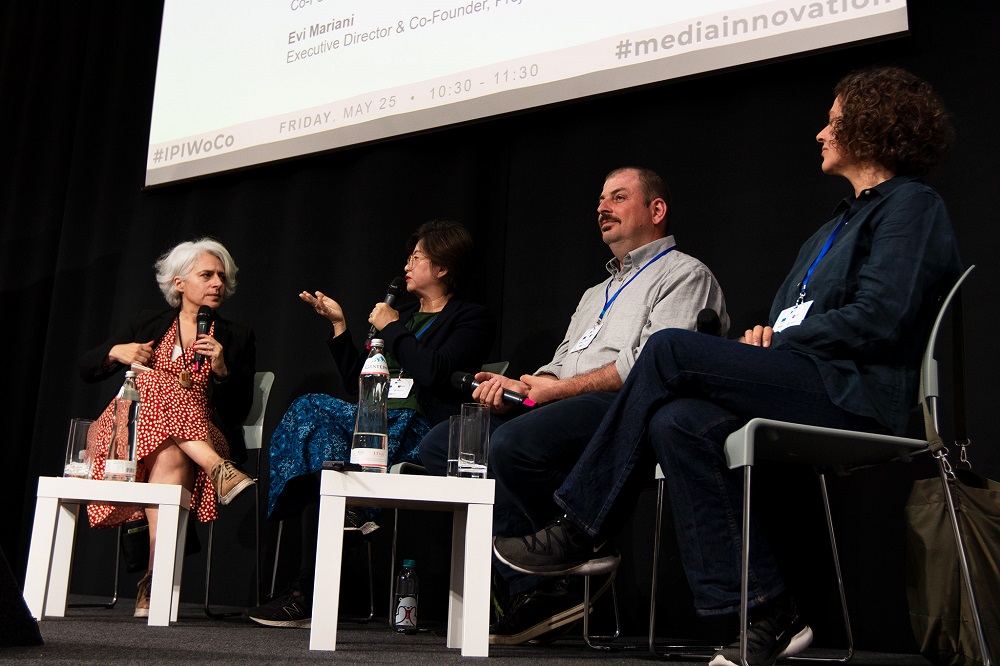Local journalism faces a slew of challenges, from maintaining sustainable businesses to engendering trust in their product. However, it’s also ground zero for disruption, where old models are out and new and innovative projects fill gaps in quality information. During a recent session at the 2023 IPI World Congress and Media Innovation Festival, panelists from four countries shared how they are shaking up the mainstream and overcoming the difficulty that comes with going it alone.
Leaving the mainstream to join new startups or local media was not an easy decision for any of the panelists, but a choice many felt compelled to make. Working as a journalist for São Paulo’s biggest outlet, Izabela Moi realized her newsroom was not covering the low-income communities that make up 85 percent of the city’s territory. In 2010, she left to found Agência Mural, which exclusively covers São Paulo’s underprivileged areas through a network of community-based journalists. “Living in a city that is very, very unequal, I couldn’t see myself not doing what is right…if I am a proper journalist I will tell the stories of this big city as it is”, Moi said.
Evi Mariani had a similar experience working with Indonesia’s legacy media. When she tried to cover underreported issues, such as forced evictions of urban poor, she experienced pushback from her editors, who preferred stories that would drive up page views. “The journalism I knew was actually kind of part of a problem”, she said. She left to found Project Multatuli, a public service journalism initiative, in 2021. Project Multatuli started with only seven staff members, but has since grown to 18. “We came to disrupt the dominant practices of the Indonesian media industry”, she said.
Despite their dedication, all panelists emphasized the political and financial headwinds that came with starting their own independent outlets. “We had to work quite a lot to build our reputation,” noted Zoltán Sipos, editor-in-chief of Átlátszó Erdély, a small investigative outlet focusing on the Hungarian community living in Transylvania, Romania. Romania’s adverse media environment made it difficult for his team to get into government press conferences and reach key sources. “People are doing everything to ignore you”, he explained.
Compelling stories at #IPIWoCo from journalists disrupting local #journalism: they quit their jobs at legacy media & went on to create community-focused media that feed ‘news deserts’ with the stories of cities & people that were simply absent of the news cycle #mediainnovation pic.twitter.com/am9tWGl04X
— Vera Penêda (@verapeneda) May 26, 2023
The pressure to stay financially solvent was the most common challenge faced by panelists. “Sometimes the only thing we feel is disrupted is our bank accounts”, said Catarina Carvalho, founder of Portugal’s Mensagem de Lisboa, a local digital media start-up in Lisbon, and moderator of the panel. Achieving financial sustainability and diversifying revenue streams takes time and patience, sometimes years. “We worked for almost 10 years without any funding”, Moi, of Agência Mural, said.
Despite a future of uncertainty, panelists felt proud to be leading the charge in what they hope will be a shift in the way news is covered. “We are still the underdog, but at least now we are recognized as practicing good, professional journalism”, Moi said. In Mariani’s view, the kinds of issues her organization covers now will soon become dominant stories in the mainstream: “In the next five years our main problem will be socio-economic inequality and environmental destruction.”
WATCH THE RECORDING HERERevisit the IPI World Congress & Media Innovation Festival 2023

